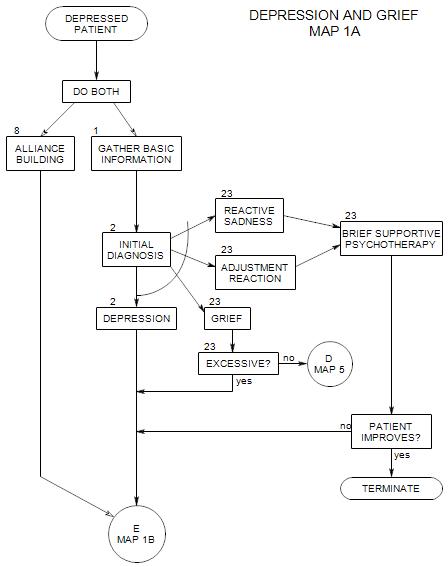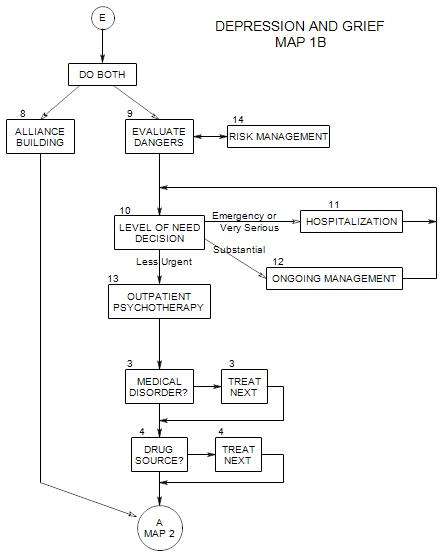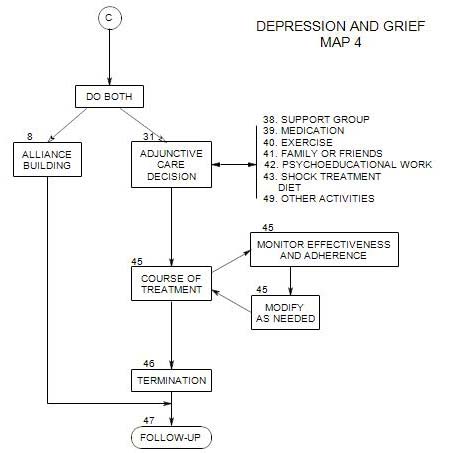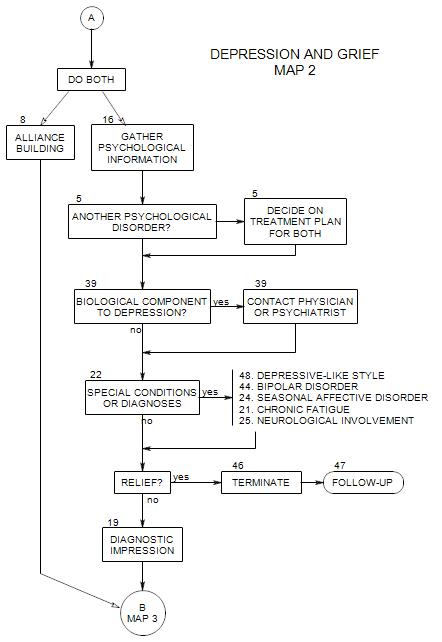
SECTIONS: 5 | 8 | 16 | 19 | 21 | 22 | 24 | 25 | 39 | 44 | 46 | 47 | 48
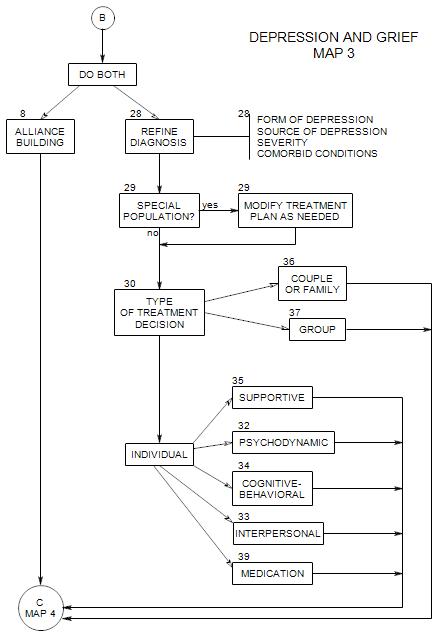
SECTIONS: 8 | 28 | 29 | 30 | 32 | 33 | 34 | 35 | 36 | 37 | 39
-
Follows Section 3 on Map 1B
Information on medications may lead to ideas for alternative medications that would not have the same side effects, or to ways of countering the side effects.
4a. Current Prescription Medications
Drugs can be used for another purpose than mood management, typically a physical symptom, and have depression as an unintended side effect.
Ask about all medications the patient may be taking, doses, frequency, and what for. Check the list in Section 26 for those that are known to produce depressive reactions. Also check medical references and ask the patient’s physician about known side effects of any medications not on the list.
4b. Over-the Counter Medications
Many people attempt to treat physical and psychological symptoms without professional advice, because they
- consider the symptoms not to be serious enough to require professional help
- don’t trust physicians
- think they should be able to handle things themselves
They may not be aware of the long-term side effects of certain over-the-counter preparations, or of their interactions with other medications. They may exceed the manufacturer’s dosage recommendations.
A major risk is lack of recognition that these drugs can be harmful, and tendency to ignore recommended dosages, possibly overdose.
Some common over-the-counter preparations that can have implications for the patient’s mood include [1] cough and cold medications; [2] antihistamines; and [3] melatonin.
COUGH AND COLD MEDICINES
ANTIHISTAMINES
MELATONIN
4c. Recreational Drugs or Alcohol
People use a variety of recreational drugs, for many reasons. Some may be used by patients to create a feeling or to manage their moods. Some may induce short or long term depression. For each drug that a patient uses, you should ask…
- the desired effect [e.g.: to feel better; to stop feeling; to go to sleep.]
- the actual effects, as the patient experiences them.
- The quantities used.
Be aware that patients typically under-report use of recreational drugs and resist attempts to limit them. You may not be able to get an accurate picture of use. It may be helpful to explain the reasons you need this information to understand the patient’s mood issues. You can try some disclaimer, such as saying that you know it can be embarrassing or that you need to know in order to diagnose and won’t judge, etc. You may also need to remind the patient that what they say is confidential and won’t be reported to authorities except under specific situations. Those situations depend on where you practice, but typically have to do with danger to self or others. You may need to obtain information about drug use from the patient’s family or friends.
ALCOHOL
Is used for many reasons: to feel festive, to join with others, to withdraw, to forget, to get to sleep, and so on. Alcohol use can lead to…
- hangovers, which often bring a “down mood.’ A person who drinks regularly may experience this on a daily basis.
- long-term depressive effects.
- negative effects on self-esteem, depending on your patient’s feeling about needing to drink, being hung over, errors of judgment while drinking, others’ reaction to his/her drinking and being drunk, etc.
Note that alcohol and other medications may compound to reduce the effectiveness of any antidepressant, or even interact with them to have a fatal consequence.
For a comprehensive approach to the treatment of alcohol issues, see the .
CAFFEINE
- may also be used for depression that the person experiences as fatigue.
- Is commonly used to stay awake after sleep loss.
- has a short-term rebound that leads to continued use.
TOBACCO
…remains a popular legal addiction for many people.
- It is often used to deal with tension, and provides some immediate relief.
- However, the long-term effect on mood is depressive.
MARIJUANA
- may be used to stimulate good feelings or to control pain
COCAINE
…is the drug of choice for many people.
- The stimulating effect may be felt as an antidote to depression. Patient feels alert, strong, creative.
- Occasional users may use it to stay awake and energetic during the day that follows a sleepless night.
- The aftereffect typically includes a depressive rebound.
OTHERS
4d. Gathering Information on Drug Use
The most effective procedure for gathering information may be to do it in stages, because people sometimes remember more as they continue to discuss their use, and because they may be reluctant to reveal much before they are involved in a trusting relationship with you. This is especially true of using substances that are illegal or socially frowned upon, or using prescription medications for unintended purposes or in excess.
You could start be asking about
- prescription medications the person is taking at present
- prescription medications he/she sometimes takes
- over the counter medications he/she takes
- cigarette smoking
- alcohol use
- other recreational drug use
Then after you have a relatively complete list, go back over the list. For each prescription medication, list the medication, and ask
- What is the regular dose_____________and when is it taken_____________?
- Who prescribed it________________ and his/her specialty_________
- When was it first prescribed?_________________
- What is it prescribed to treat?__________________
- Effect on its primary target is?___________________________
- Taken how long at this dose?_____________
- Any side effects?_________________especially on mood?__________
For each over-the counter medication and other drug, list it and ask,
- How much does the person take/use?_________ When?___________
- Why take it?___________________
- When started_______________________
- Effect on primary target is?________________
- Are there side effects?___________________
In subsequent sessions, you can ask if the person has thought about medications, and whether he/she has remembered others or there has been a change in use.
